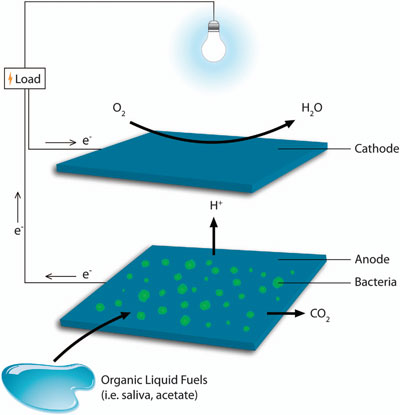| Posted: Mar 24, 2014 | |
Spit on it - Micro fuel cell powered by saliva |
|
| (Nanowerk Spotlight) Microbial fuel cell (MFC) technology is a great example of environmental biotechnology that turns the treatment of organic waste into a source of electricity. In this type of fuel cell, the naturally occurring decomposing pathways of electrogenic bacteria – the bacteria bacteria 'eat' the waste and in turn release electrons – are used to both clean water and produce electricity by oxidizing biological compounds from wastewater and other liquid wastes. | |
| By miniaturizing MFCs it becomes possible to build miniature energy harvesters that could power lab-on-chip or point-of-care diagnostics devices independent of any external power source. | |
| "Because micro-sized MFCs utilize less electrode area and less liquid fuel volume than their macro-sized counterparts, optimizing the electrodes and the fuel sources are the most important factors in designing a micro-sized MFC for maximum power production," Muhammad Mustafa Hussain, an Associate Professor of Electrical Engineering at King Abdullah University of Science and Technology (KAUST) in Saudi Arabia, tells Nanowerk. "Therefore, the selection of the electrode material is crucial." | |
| In new work, Hussain and his team have now developed a saliva-powered, micro-sized MFC that already generates almost 1 µW – enough power to be directly used as an energy harvester in microelectronic applications. The team reported their findings in the March 7, 2014, online edition of NPG Asia Materials ("Energy harvesting from organic liquids in micro-sized microbial fuel cells"). | |
 |
|
| MFC process diagram describing the main components of an MFC and reactions occurring within the device. Organic liquids are broken down by bacteria into protons, electrons and carbon dioxide at the anode, and oxygen from the air is utilized at the cathode. (© Nature Publishing Group) | |
| Hussain and his graduate student Justine Mink, who is the paper's first author, have spearheaded MFC miniaturization efforts. As we reported in a previous Nanowerk Spotlight ("A sustainable nanotechnology design for micro-sized microbial fuel cells"), the team developed a one-chamber device by removing the proton exchange membrane and replacing the cathode/chemical electron acceptor combination with an air cathode and ambient oxygen electron acceptor, thus making the entire device small enough for system-on-chip functionality. | |
| In this new work, the researchers have now miniaturized the MFC to be the size of a fingertip; in essence a miniature battery that they powered with saliva. | |
| The fuel for the device could be any liquid like waste water or beverages that have organic matter inside such as sugar. | |
| While in their previous work the team used multi-walled carbon nanotubes as anode material, this time they further increased the fuel cell's power production by using pure multi-layer graphene for the anode. | |
| "We utilized this graphene anode/air cathode micro-sized MFC to test whether human saliva could be a viable fuel source for powering such a device," says Hussain. "Although predominantly water, saliva is composed of inorganic and organic components, such as glucose, that can be utilized for fuel by bacteria." | |
| Testing the MFC with both graphene and commonly used carbon cloth anodes, the researchers found that saliva indeed could power a MFC and that the graphene anode resulted in superior performance. | |
| "Our results are yet another step towards a sustainable future using a multidisciplinary approach involving semiconductor industries’ state-of-the-art CMOS technology, environmental science and engineering, and bio-chemistry," says Hussain. | |
| The KAUST team is now working towards using such MFCs to power sensors and lab-on-chip devices for water testing and miniaturized electronic dialysis devices. They are also exploring on how to increase the power production of the devices by improving more efficient air cathodes and improvements in cathode size and efficiency. | |
 By
Michael
Berger
– Michael is author of three books by the Royal Society of Chemistry:
Nano-Society: Pushing the Boundaries of Technology,
Nanotechnology: The Future is Tiny, and
Nanoengineering: The Skills and Tools Making Technology Invisible
Copyright ©
Nanowerk LLC
By
Michael
Berger
– Michael is author of three books by the Royal Society of Chemistry:
Nano-Society: Pushing the Boundaries of Technology,
Nanotechnology: The Future is Tiny, and
Nanoengineering: The Skills and Tools Making Technology Invisible
Copyright ©
Nanowerk LLC
|
|
|
Become a Spotlight guest author! Join our large and growing group of guest contributors. Have you just published a scientific paper or have other exciting developments to share with the nanotechnology community? Here is how to publish on nanowerk.com. |
|
